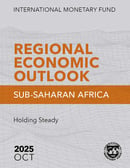This web page provides information in on the activities of the Office, views of the IMF staff, and the relations between Malawi and the IMF. Additional information can be found on Malawi and IMF country page, including official IMF reports and Executive Board documents in English that deal with Malawi.
At a Glance
- Current IMF membership: 191 countries
- Malawi joined the Fund in July 19, 1965; Article VIII (December 7, 1995)
- Total Quotas: 138.8 Million
- Outstanding Purchases and Loans (SDR): 296.06 million (June 30, 2025)
- Last Article IV Consultation: Published on August 6, 2025: Country Report No. 25/226.
Office Activities
Presentation at the University of Livingstonia (Kaning’ina campus), Mzuzu University, Malawi University of Science and Technology, and Malawi University of Business and Applied Sciences. July 24 - August 1, 2025.
August 1, 2025
Launch of the October 2019 Sub Saharan Africa Regional Economic Outlook
Presentation at the Bingu International Conference Center
November 22, 2019
IMF's Work on Malawi
No results found. Either there was an error with the web service or there is no data returned by the web service.
Fraudulent Scam Loan Application Forms Using the Name of the IMF
For more information please see Fraudulent Scam Emails Using the Name of the IMF
Regional Economic Outlook for Sub-Saharan Africa
October 16, 2025

The outlook for Sub-Saharan Africa is showing resilience, despite a challenging external environment with uneven prospects in commodity prices, still tight borrowing conditions, and a deterioration of the global trade and aid landscape.
Read the Report
Departmental Papers on Africa
 The Departmental African Paper Series covers research on sub-Saharan Africa conducted by International Monetary Fund (IMF) staff, particularly on issues of broad regional or cross-country interest. The views expressed in these papers are those of the author(s) and do not necessarily represent the views of the IMF, its Executive Board, or IMF Management.
The Departmental African Paper Series covers research on sub-Saharan Africa conducted by International Monetary Fund (IMF) staff, particularly on issues of broad regional or cross-country interest. The views expressed in these papers are those of the author(s) and do not necessarily represent the views of the IMF, its Executive Board, or IMF Management.



